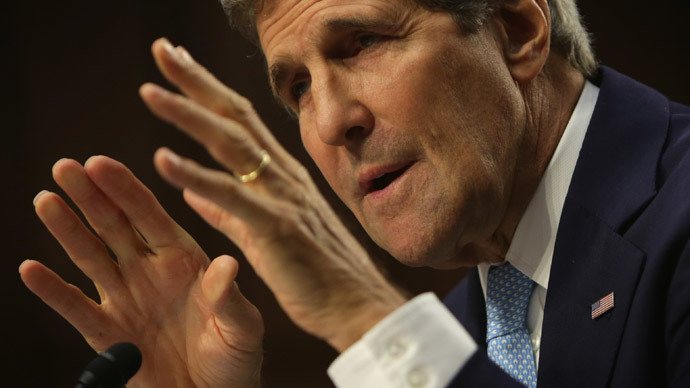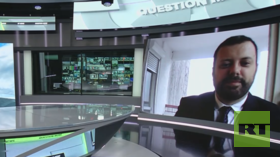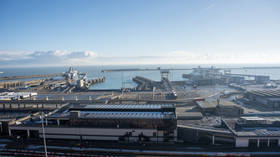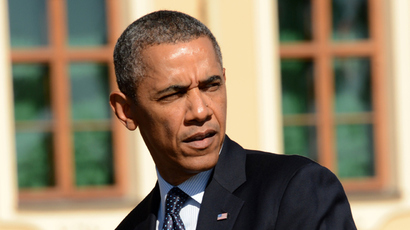US accuses Syria of chlorine gas attacks

The US claims Syrian President Bashar Assad has broken the chemical weapons treaty he agreed to earlier this year, by launching chlorine gas attacks in Syrian villages. It comes as the Senate officially approved a plan to arm and train Syrian rebels.
US Secretary of State John Kerry on Thursday accused Assad of
breaching the terms of the global pact on chemical weapons, by
unleashing chlorine gas via barrel bomb attacks earlier this
year.
“We believe there is evidence of [President Bashar] Assad’s
use of chlorine, which when you use it – despite it not being on
the list – it is prohibited under the Chemical Weapons
Convention,” Kerry told the US House of Representatives.
“He’s in violation of the convention.”
Kerry went on to add that Washington is studying ways to hold
Assad to account.
The US official was not alone in what appeared to be a new wave
of Western pressure on Assad’s government, which was previously
accused of perpetrating deadly chemical attacks in March 2013
near Aleppo and in August 2013 in Ghouta.

A former British army officer who led The Telegraph’s independent investigation into the alleged chlorine gas attacks said Kerry’s comments showed that war crimes were continuing to take place in Syria.
“Five months after we proved that Assad had the US red line that chemical weapons must not be used, Secretary Kerry has now stated that Assad has broken international law,” Hamish de Bretton-Gordon said. “Since then there have been multiple other incidents including another attack on Kfar Zita that killed one person just a few days ago. Surely there must be action to stop this now.”
Earlier this month, the Organization for the Prohibition of Chemical Weapons (OPCW) – the world’s chemical watchdog – confirmed the “systematic” use of chlorine as a weapon in war-torn Syria.
Meanwhile, the US Congress has given its final approval of a plan to arm and train select “moderate” Syrian rebels who are trying to both overthrow Assad and defeat Islamic State (ISIS/ISIL) militants.
The Senate, controlled by President Barack Obama’s Democratic Party, easily passed the measure late Thursday by a bipartisan vote of 78-22. The US will now spend $500 million to arm and train the anti-government militants, as well as to expand its military action in Iraq.
Meanwhile, French President Francois Hollande said his country is ready to launch airstrikes against ISIS militants inside Iraq. However, Hollande rejected extending the aerial bombardment to Syria.
The US Senate’s approval of arming the Syrian rebels comes despite concerns by some Democrats that the US is involving itself in another Middle East war – as well as some Republicans who say the effort will not do enough to defeat the ISIS.
Duncan Hunter, a Republican representative from California and a former marine who served in Fallujah, said: “Army Islamists to fight other Islamists is not a winning strategy. I don’t believe the weapons and tactics that we bestow to the Islamists will only be used against America’s enemies.”

However, Obama praised the House vote, saying the arming and training of rebels is a key part of his comprehensive plan to defeat the extremists.
Since the start of the bloody uprising in Syria that began in March 2011, Assad’s government and the rebels have traded accusations of using chemical agents, including chlorine.
In April 2013, Israel – an old foe of its northern Arab neighbor – was the first to charge Syria with using chemical weapons against areas held by rebels in the ongoing civil war.
Western powers soon echoed the charge and Washington threatened Damascus with airstrikes.
A series of initiatives by Russian President Vladimir Putin
managed to prevent US airstrikes and led to Assad's decision to
give up the government's chemical arsenal.
Damascus promised to hand over all its chemical arms, and tons of
chemical agents have been destroyed by international monitors.
Syria did not have to declare its stockpile of chlorine under the
disarmament deal. Chlorine is a weak toxic agent that can be
considered a chemical weapon if used in battle, but the material
is widely used for commercial and domestic purposes.
International diplomats told Reuters this week that Syria had
revealed a previously undeclared research and development
facility and a laboratory to produce ricin. Those disclosures
appeared to support Western allegations in recent months that the
Assad regime had not been fully transparent in detailing its
chemical weapons program.
















